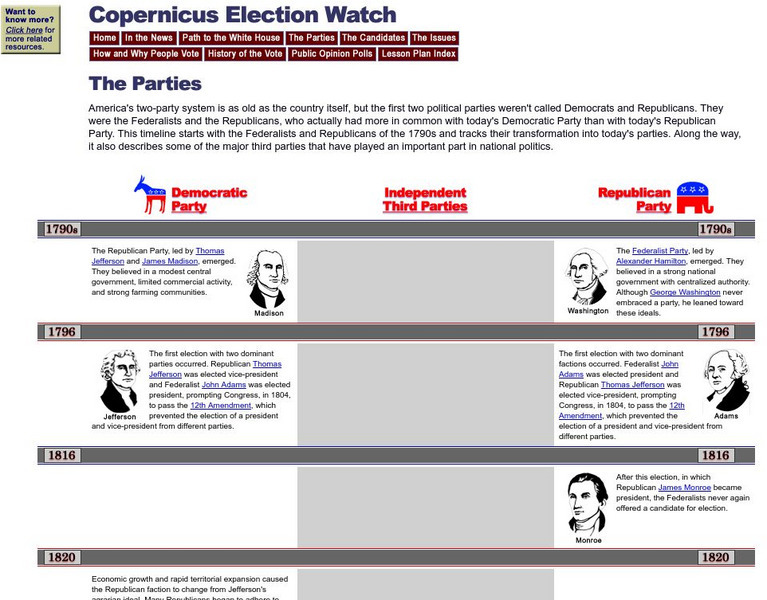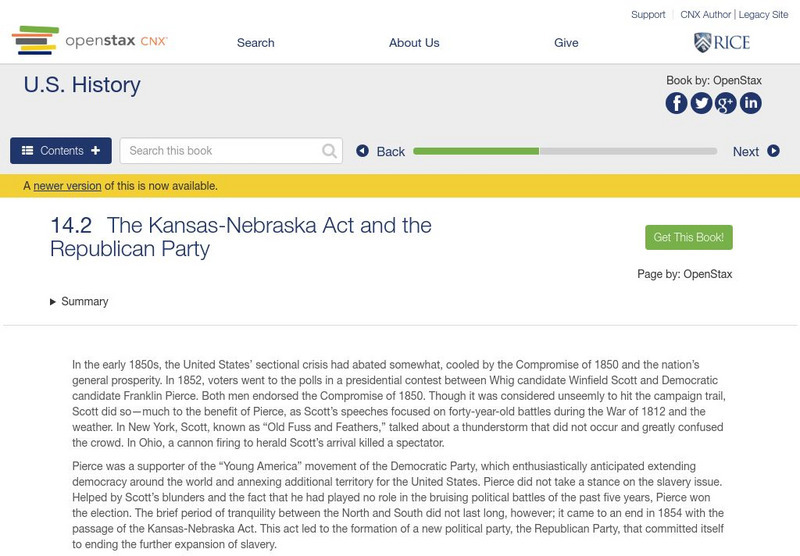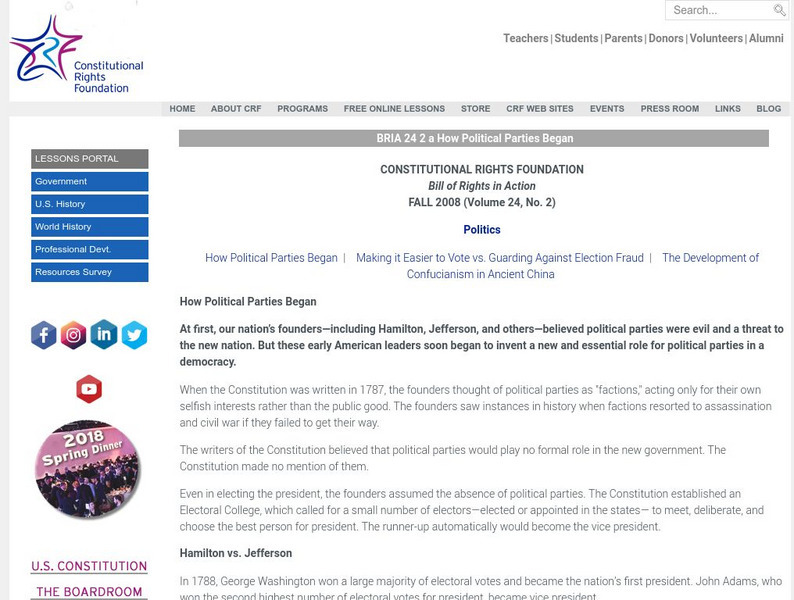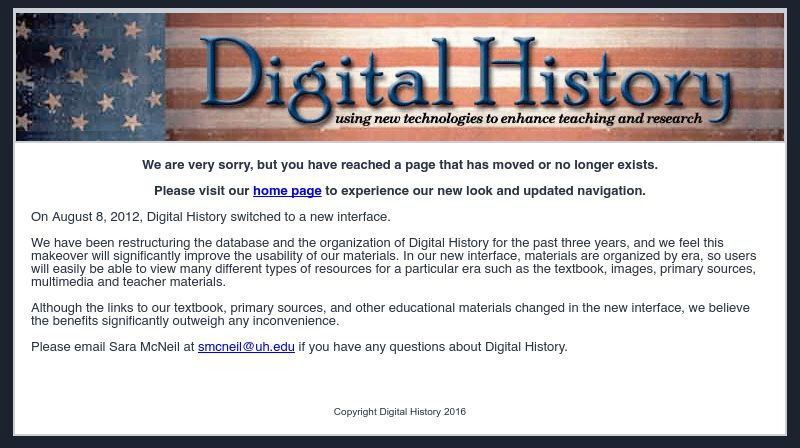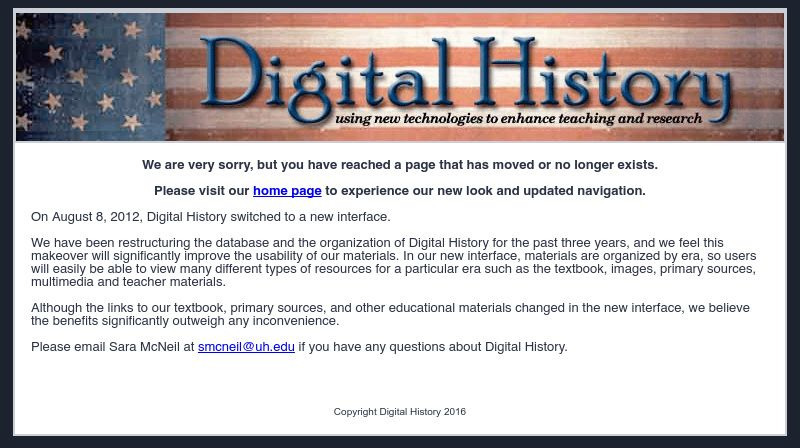Hi, what do you want to do?
Curated OER
The Election Is in the House: 1824: The Candidates and the Issues
Young scholars list some changes in presidential election laws and/or procedures since 1796, and cite examples from presidential campaign materials from 1824.
Curated OER
Cartoons for the Classroom: Celebrating the 19th Amendment
Eighty-eight years after women earned the right to vote, a women ran for president. Young analysts consider the role women play in politics, how they are portrayed, the standards they are held to, and if they are still treated unfairly...
Curated OER
Red, Undecided, and Blue
Students analyze voter preferences in past elections, and then write letters to a presidential candidate, recommending winning strategies drawn from their research.
Curated OER
You Either Know it or You Don't 5
In this Internet research skills learning exercise, students respond to 15 short answer trivia questions. Students may use reference sources if they don't know the answers.
Curated OER
The Gettysburg Address: An American Treasure
Learners apply information found in Lincoln's speeches, especially The Gettysburg Address, to create a persuasive speech on a current topic.
Curated OER
The Election Is in the House: Was There a Corrupt Bargain?
Learners take a stand, supported by evidence, on whether there was a "corrupt bargain" between Henry Clay and John Quincy Adams.
Curated OER
From the President's Lips: The Concerns that Led to the Sedition (and Alien) Act
Young scholars research and briefly summarize the international situation during John Adams's presidency. They list the concerns that led to the Sedition Act and describe it.
Curated OER
Chapter 8: Reconstruction
In this Reconstruction worksheet, students read assigned textbook pages regarding Reconstruction plans and respond to 44 short answer questions.
Other
Republican Party of Texas: Overview and History
Detailed history of the Republican Party of Texas.
Other
Copernicus Election Watch: History of the Parties
This site has a great timeline that tracks the history of the Democratic, Republican, and some Independent Third Parties. Also some excellent links at the bottom of the page.
OpenStax
Open Stax: The Kansas Nebraska Act and the Republican Party
Students will learn about the political ramifications of the Kansas-Nebraska Act and the founding of the Republican Party.
Annenberg Foundation
Annenberg Learner: Democracy in America: Political Parties: Mobilizing Agents
This unit examines the significance of political parties in American politics, highlighting their functions, differences, and influence on the public for political decision making. Offers video, readings, web resources, and activities.
Constitutional Rights Foundation
Constitutional Rights Foundation: How Political Parties Began
Activity in which students examine the history of political parties in America and evaluate the role they play and reasons they emerged. Questions for discussion and small group work to compare the late 1700s visions of Republicans and...
University of Groningen
American History: Outlines: Political Parties
Brief overview of the political party system in the U.S. explaining the emergence and longevity of the Democratic and Republican Parties.
Other
A Brief History of American Major Parties
A good, brief history of the two party system in the United States.
Other
Guide to American Political Parties
Complete directory of the political parties that are active in the United States. Links to each party's website are included along with a brief overview of each one with major players.
Other
Republican Party: Our History
Read the first few paragraphs of this article to find out about the formation of the Republican Party in 1854 and how it affected the political scene in the last part of the 1850s.
Other
Furman University: Republican Party Platform, 1860
This site, which is provided for by the Furman University, gives the text of the 1860 Republican Party Platform.
Digital History
Digital History: The Breakdown of the Party System
As the Whig Party collapsed and the new Republican Party was forming, there was a flash-in-the pan party, the Know Nothing Party, that filled the void for a few years. Read about the success of the party in electing legislation, and find...
Independence Hall Association
U.s. History: Two Parties Emerge
Although George Washingon denounced the creation of political parties, they came roaring into play in the election of 1796 in which John Adams, representing the Federalists, ran against Thomas Jefferson, who represented the...
Siteseen
Siteseen: Government and Constitution: Republican Party History
Article provides a history of the Republican party and details on the eighteen Presidents who have belonged to the Republican Party through George W. Bush.
Khan Academy
Khan Academy: Ap Us History: Period 6: 1865 1898: Politics in the Gilded Age
The study resource from Khan Academy provides an overview of Period 6: 1865-1898 in American History. The politics in the Gilded Age is discussed in this lesson. This resource is designed as a review for the AP US History Test.
Digital History
Digital History: Emergence of a New Party System
There were many reasons for splits in the first Republican party, now usually referred to as the Democratic-Republican Party. See how that changed the party itself and the ways those changes affected the election of 1824.
Digital History
Digital History: The Birth of Political Parties
A brief look at the beginning of political parties in the new American nation. Find out the views of the two parties.














